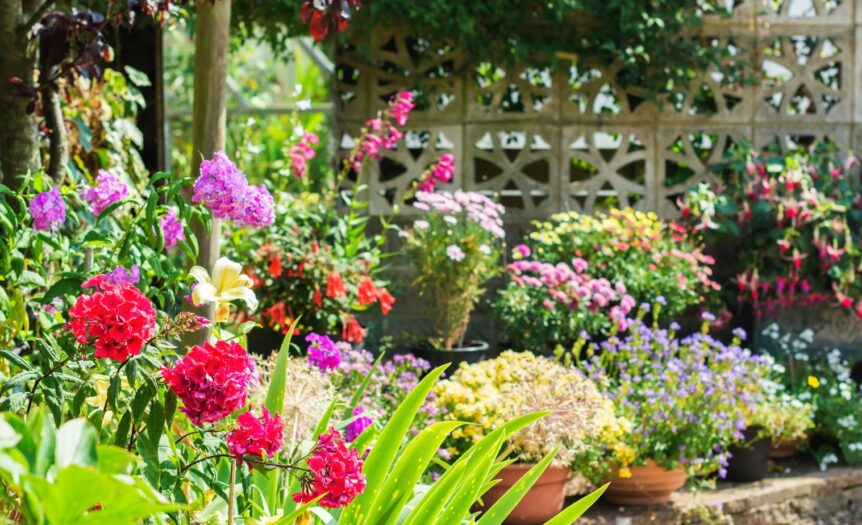Flowers make your garden landscape extraordinarily beautiful, especially when it is well-planned, groomed, and managed on a regular basis.
Also, designing a flower garden requires a lot of thought, research, and work, particularly when you aim to keep it fresh and vibrant and flowering all year round.
Whether you’re a beginner gardener or already have a flourishing garden in the backyard of your house, these essential expert tips help you grow your beautiful flower garden year-round.
Tip #1: Research The Characteristics Of The Native Flowers And Plants
Before you start designing your beautiful flower garden, you must explore various blooming plants as expert garden designers do. Research the characteristics of the flowers thoroughly, and find out which ones can grow the best in your area, along with their light condition and water requirements.
Knowing the compatibility of the plants you want to grow for flowers to your region’s soil allows you to combine annuals, container plantings, and perennials for four-season color.
Reach out to public gardens, local extension offices, gardening blogs, and other resources. You can also visit the garden centers and nurseries at different months to get an idea of the blooming schedule, foliage color, and overall appearance of plants in various seasons throughout the year.
Tip #2: Take Inventory Of The Plants In Your Garden
Make sure to take a detailed inventory of all the plants in your garden. Explain their appearance during different seasons, blooming schedules, and other times. You can keep a simple journal or create a spreadsheet of all these plant names with separate columns to denote the commencing weeks.
With the spreadsheet or journal, you can record the natural progression of all the plants. This will also reflect the gaps you have in between, which you can fill by choosing any perennial, annual, or shrub.
Tip #3: Choose A Flower Garden Style
If you are not sure what flower garden style you should choose, start with your own preferences. Figure out what type of flowers, colors, and combinations excites you. What natural landscape styles are your favorite? Also, what would your ideal garden look like? List out the type of plants and flowers you would want.
Then, you can also consider your house’s architectural style and ambiance surrounding it. Some prefer a contemporary leading garden, whereas others prefer a minimalist approach with clearly defined flower bed linings and separations.
Tip #4: Opt For Complementary Flower Colors
The beauty or overall aesthetics of a flower garden comes from the type of color scheme you are choosing. This can be tricky because often, people overdo this with all sorts of colors, making a visual mess, whereas, on the other hand, people opt for bad combinations.

The best way to start is to select a color pallet or wheel where you choose the color of plants in the same shade or hue to complement each other. This makes your garden visually pleasing to the eye. – Experts from 800Flower reveal.
Tip #5: Go For The Year Round Perennials
Perennials are certainly more expensive than annuals, but in the long run, they are a great option to keep your garden growing all year round. With proper maintenance, they keep growing and coming back, year after year.
They can be the perfect backbone of your garden, maintaining a certain amount of greenery throughout the season. You can always further add more annuals to complement perennials, create contrast or more color in your garden.
Choose long bloomers and various flowering plants that bloom at different times to ensure there are always plenty of flowers in your garden. Some perennials like coneflowers, salvias, and roses have extended bloom seasons or can bloom more than once
Tip #6: Maybe Start With Easiest Flowering Plants
If you’re new or struggling to create a flourishing garden, the best idea is to start small and easy. So, to begin with, do not opt for flowers that require much work or require complicated maintenance.
Opt for the easiest flowering plants that have a reputation for being ideal for beginners or low-maintenance plants.
Tip #7: Use The Blend Of Annuals And Perennials In The Summer
In summer, there is no shortage of interesting-looking plants. However, consider mixing the annuals and perennials to maximize variety and color in your garden.
Go for the most popular annual flowers in summer, such as petunias, zinnias, and marigolds, for their vibrant color. Further, colorful foliage flowers such as purple basil and begonias should also be considered.
Then, mix them with perennials, usually muted in colors compared to annuals such as milkweed, black-eyed Susan, etc.
Tip #8: Decide The Plant Size You Prefer
When you are making the selections for your garden, you also need to consider the plant size it can fully grow to eventually. It also depends on the type of garden style you choose, along with the placement and purpose of the plants.

For example, if you want to create a colorful foundation garden, go for the tallest plants in the back, but not so tall that they can block doors or windows.
Keep in mind the overall mature size of a plant when you are considering them, and ensure they have enough space or room to grow without overcrowding.
Tip #9: Add A Focal Point To Your Flower Garden
This one tip can dramatically improve your garden’s visual aspect and make it more appealing to people. This is about adding a focal point that draws the attention first of a viewer, after which, from the same moment, they explore the entire garden easily.
This also provides a space spreading across the sidelines of all the flowerbeds, making you or a gardener easily take care of the plants, water them, etc. You can even create pavements around the focal point going around your garden.
You can use a large flower bed with shrubs in the center or an exquisite garden art piece for focal points.
Tip #10: Choose Flowers That Attract Butterflies
Butterflies in your flower garden will make your garden look even more beautiful and lively. For that, choose flowers that attract caterpillars and butterflies, such as phlox, cosmos, butterfly weed, dill, milkweed, and dill.
Wrapping Up
Depending upon where you are in your gardening journey, you can leverage any, few, or all of these effective tips to grow and improve your beautiful garden. If you’re a beginner, consider going for a small garden or one or two flowering beds and flowers that grow easily.








